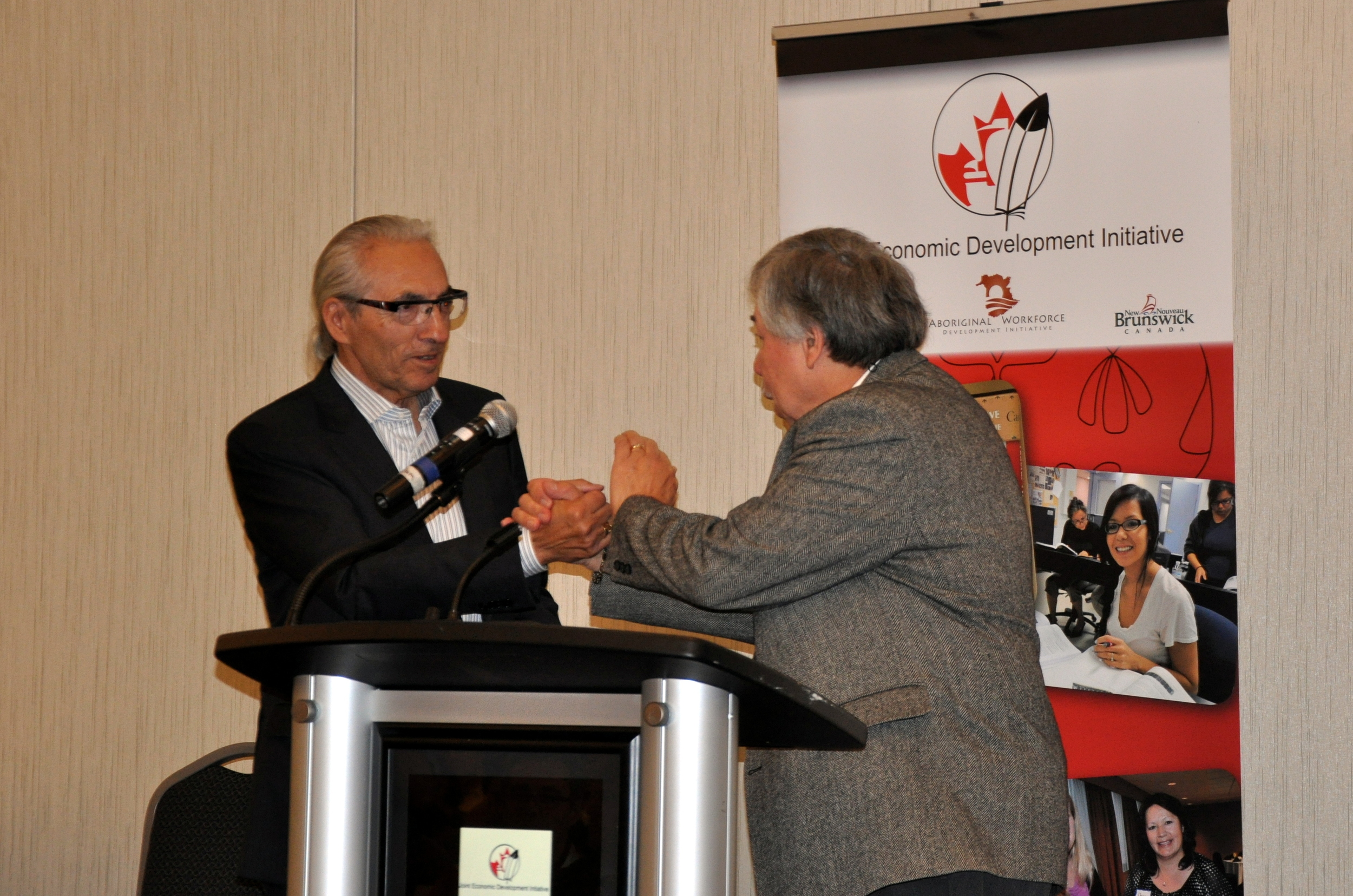Phil Fontaine and Alex Dedam (President of JEDI)
JEDI just wrapped up our biggest and best Plenary yet. We had a full house with 150 people from industry and First Nation communities gathered to hear Phil Fontaine speak on the Plenary’s theme: Moving Forward Together: Strategic Partnerships to Advance Aboriginal Economic Development. Phil’s speech touched on a lot of interesting points, some of the key ones being mutual respect, learning about our differences, and building relationships with industry.
Phil started the day by talking about First Nations’ relationships with government and how there is room for improvement in this area.
“We have to fix those relationships,” said Phil. “The responsibility to fix that falls on our collective shoulders. It is a collective burden. We are best going to be able to address that if we know and understand each other better. Knowing and understanding has been missing from our relationships.”
Phil also spoke about how First Nations’ relationships with the general public in Canada could use some work.
“Too many people in our country don’t know anything about Indigenous people,” said Phil. “We haven’t done a good enough job in teaching and informing Canadians about ourselves. And non-First Nation people have not reached out either. Our relationships can be improved and must be improved.”
Phil continued the discussion on relationships and related it to industry and land ownership. He stated that businesses need to engage with First Nations early and with respect in order to create a solid foundation for future discussions.
“They must know and learn about us, and know that we have different languages and cultures and ways of doing things,” said Phil. “The days of industry coming in somewhere and doing what they want without consultation are over. It is up to us to shape the way that things change going forward. It is up to us to engage in bridge building and relationship building. There is urgency in this matter. Our communities are becoming better educated and more politically aware. Aboriginal title and treaties have been around for a long time. Where they used to be a secondary interest they are now of the utmost importance.”
Phil indicated that there are 5 key areas that need to be addressed when building relationships between industry and First Nations:
- Resource companies need to engage with First Nations upfront. This approach will help avoid costly delays.
- Negotiations not litigation. First Nations have constitutional rights protected under the law. These rights cannot be ignored or strong-armed. Negotiations must always be done respectfully and are preferable to court action.
- Rethink the vision. The new vision must include the interests of First Nation people. First Nation people are not anti-development or anti-business; First Nation people want to be treated fairly and justly.
- Every First Nation community has a right to say yes or no to development. Communities must have all of the available information on a project so that they can make an informed decision.
- Public opinion is really important in this process. Resource companies need to be open as it will play a significant role in development decisions.
In the past, the conversations between industry and First Nation communities did not revolve around partnerships, joint ventures, shared equity, but now that has become the language.
“Our people are not content to talk about jobs,” said Phil, “we now talk about the possibilities of partnerships, possibilities of equity, and possibility of ownership. There has been a shift of attitudes in our community. It has been an encouraging shift. There is a willingness to engage in a more productive way.”
Phil continued by saying that First Nation communities across Canada now have about 400 agreements in place with different mining interests. In fact, some First Nation communities now have equity agreements in place that give them a percentage of the project’s profits.
“There are still many challenges ahead,” said Phil. “We all need to learn new ways of doing business. Industry needs to be sensitive to the customs and ways of others when doing business and we are willing to help them. It is an exciting time for First Nation people.”
Phil pointed out that First Nations people are rights holders, not stake holders. Recent court decisions makes it clearer that First Nation communities can assert title, especially in unceded territories. First Nation people have to say yes to a project before it proceeds. They need to be consulted early on in the process and terms need to be negotiated to avoid time in the courtroom.
“In the next decade, there will be about $50 billion worth of investment and much of it will be in the resource sector,” said Phil. “Most of it will be on First Nations’ lands and territories. The courts have been clear on industry obligations moving forward. The stage has been set. It is incumbent upon all of the interests to come together. At some point there has to be a convergence of interests.”

